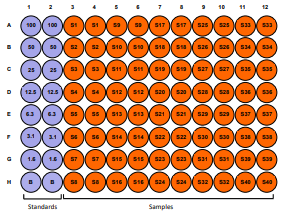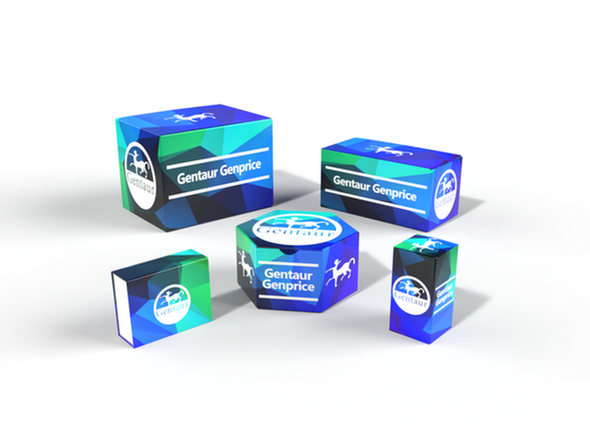Description
Canine CRP Detection Assay Kit - Cat Number: 6027 From .
Research Field: Inflammation
Clonality: N/A
Cross-Reactivity:
Host Origin: N/A
Applications: N/A
Isotype: N/A
Detection Range: 100 ng/ml-1.6 ng/ml
Sample Type: Serum, Plasma, Saliva
Concentration: N/A
Immunogen:
PRODUCT SPECIFICATIONS
DESCRIPTION: ELISA kit to quantify canine CRP
FORMAT: Pre-coated 96-well ELISA Plate with removeable strips
ASSAY TYPE: Sandwich ELISA
ASSAY TIME: 1.5 hours
STANDARD RANGE: 100 ng/ml to 1.6 ng/ml
NUMBER OF SAMPLES: Up to 40 (duplicate) samples/plate
SAMPLE TYPES: Saliva, Serum, and Plasma
RECOMMENDED SAMPLE DILUTIONS: 1:1 (at least)
CHROMOGEN: TMB (read at 450 nm)
STORAGE: -20°C
VALIDATION DATA: Intra-Assay (0.7-10%)/Inter-Assay (6-9%)/Spiking Test (105-109%)
NOTES
INTRODUCTION
Acute phase proteins (APPs) are blood proteins released from hepatocytes as an integral part of acute phase responses (APR). The APR,
as a part of the innate host defense system, is triggered by tissue damage and inflammation caused by infectious, immunologic, or neoplastic
agents. One of the well-characterized APPs, C-reactive protein (CRP) is an annular pentameric protein consisting of 224 amino acids (25kDa)
(1). CRP binds to the phosphocholine expressed on the surface of dead cells and bacteria (2). These complexes activate the complement
system, leading to the phagocytic removal of the complexes by macrophages.
CRP levels in canine serum are significantly elevated after inflammatory irritation, surgical trauma, or inflammatory diseases such as
pyometra, panniculitis, acute pancreatitis, polyarthritis, septic arthritis, and hemangiosarcoma (3-7). Therefore, serum CRP is considered a
measure of inflammation in canines. Interestingly, CRP is also found in canine saliva, and saliva CRP levels correlate with serum CRP levels.
Because blood collection is an invasive procedure, saliva collection presents an alternative method for CRP collection. Like serum CRP,
saliva CRP can be used as a marker to monitor inflammation status (8). However, as saliva CRP levels are about 1% of serum CRP levels,
a highly sensitive and reliable assay is required (5, 9-11).
, Inc provides a Canine CRP Detection ELISA Kit (Cat # 6027) which is compatible with both serum and saliva samples. It can be
used for detecting and monitoring canine inflammation, as well as in studies investigating inflammation. An immunochromatographic test for
veterinary use is currently in development. Please contact , Inc. at support@.com for more information.
KIT COMPONENTS

ASSAY OUTLINE

NOTES BEFORE USING ASSAY
NOTE 1: It is recommended that the standard and samples be run in duplicate.
NOTE 2: Warm up all buffers to room temperature before use.
NOTE 3: Crystals may form in Wash Buffer, 20X when stored at cold temperatures. If crystals have formed, warm the wash buffer by placing
the bottle in warm water until crystals are completely dissolved.
NOTE 4: Measure exact volume of buffers using a serological pipet, as extra buffer is provided.
NOTE 5: Cover the plate with plastic wrap or a plate sealer after each step to prevent evaporation from the outside wells of the plate.
NOTE 6: For partial reagent use, please see the assay protocol’s corresponding step for the appropriate dilution ratio. For example, if the
protocol dilutes 50 µl of a stock solution in 10 ml of buffer for 12 strips, then for 6 strips, dilute 25 µl of the stock solution in 5 ml of
buffer. Partially used stock reagents may be kept in their original vials and stored at -20⁰C for use in a future assay.
NOTE 7: This kit contains animal components from non-infectious animals and should be treated as potential biohazards in use and for
disposal.
PLATE LAYOUT







